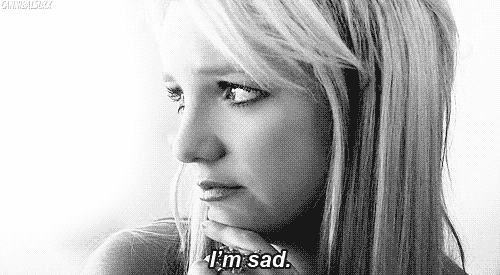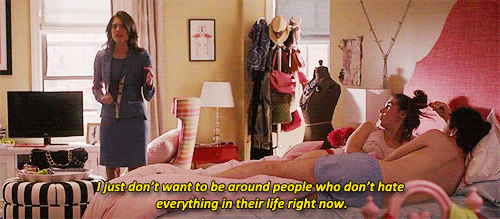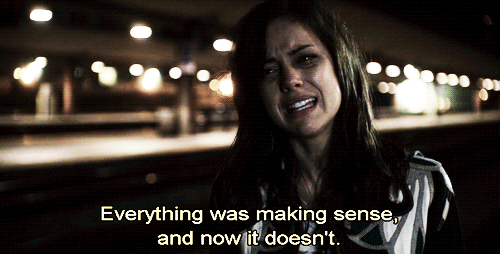Things to avoid: THIS.
1) Triggers
One of the first steps to controlling your temper is knowing what sets it off. Take a good look at situations that have made you really angry or upset - can you find a common thread? For me, there a few different triggers: disappointment, feeling under-appreciated, being controlled or told what to do, and being ignored. Any of these can SET. ME. OFF. For example, this weekend's horse show. I won my first class (woohoo!), but came in 3rd in the second class. Normally, 3rd is pretty good. However, after 6 straight 1st place ribbons, 3rd was more than a little disappointing. I was mad at myself. I was heavily disappointed. This is not a good combination for me, and could have become a serious trigger.
Me, around 1:45 on Sunday.
This leads us to...
2) Know The Reaction - Part One
A huge part of controlling your reaction to triggers is knowing how you react internally. Think again about an upsetting situation and try to put together a picture of your gut reaction, step by step. Going back to this weekend, my first feeling was sadness. I was upset that I didn't win. Next, I went to frustration. I was frustrated because I made a couple of "easy-fix" errors in my ride that probably cost me the class. Thirdly, I got angry at the situation. I was angry that I didn't draw an easier horse to ride and angry that my winning streak got broken. Finally, I got annoyed. I was partially annoyed with the whole situation of not winning and annoyed at myself for being annoyed.
Joffrey Baratheon is a total punk, but he feels my pain.
3) Know The Reaction - Part Two
The second part of controlling the reaction is knowing your outward reaction. Y'all, I have NO poker face. People know when I am upset. So in this situation, I was not going to be able to hide my disappointment. HOWEVER, until I learned to wrangle myself, my exterior reaction would have been one or more of the following: crying, saying ugly things to other people, yelling, throwing things, etc. Essentially having a temper tantrum. Not cute on toddlers, REALLY not cute on 24-year-olds. And CERTAINLY not lady-like. Instead, I tried to explain my disappointment to my coach and my teammates. When I felt like any of them didn't get it or I wasn't getting the kind of response and support I needed, I walked away. While this may upset some folks, believe me, it's better than what they could have gotten. I waited until Homegirl and I were in the car, then she let me talk through it and sort out what I was feeling, which helped immensely. I still grumped along for about 30 more minutes (okay, 2 hours), but eventually, we got to "what Gillian needs to do to be successful at regionals."
Good anger management.
4) Be Ready To Explain
Y'all, sometimes people just won't get why you are upset, or they won't understand it fully. This happened. I felt like my coach just thought I was mad I didn't win, which was partially true, but I also wanted her to understand that I was nervous because it shook my confidence, that I was disappointed because I felt like the good parts of my ride went unnoticed, that I was mad at myself for making what I consider a rookie error. I grouched because I felt like she didn't want me to be disappointed, but disappointment is how I get better. So since she had other riders to coach, I just left. I did, however, text her and apologize for grouching and quickly explained where my head was. I plan to finish this explanation when I lesson this week. It's okay to react. It will happen. Just be ready to explain what's going on. Only you know, kids, and your loved ones deserve an explanation when you can calmly give one.
This, but calmer.
5) Learn From It
This is two-fold for me. First, learn what you can do better on your end next time. For me, I learned from my ride what I need to focus on going into regionals. This is super important, and can be applied in any situation. Secondly, if you got mad in a situation, figure out how to avoid that situation in the future or, if it is unavoidable, how to handle it better. Maybe it's the way your boyfriend phrases something; tell him why it upset you and that you'd prefer he said it another way. If it happens again, reiterate it to him, but don't go red zone on him for doing it again. We're all human, and he probably forgot. If he keeps doing it and doesn't care, dump the jerk, obviously. My goal is to handle disappointment better by focusing solely on the good parts. In this case, I would focus on the fact that I got my horse to lope with his head down (he looked like a giraffe for some other people), that my 270 degree pivot on the haunches was awesome, and that I kept a controlled pace. This doesn't mean ignoring what needs to be improved - it just means bringing the positive to the front while the "wound" is fresh, and waiting until you are calm to delve into "what went wrong."
Self-reflection.
I am by no one's estimation perfect at this, and I do occasionally still have melt downs. However, with practice, I have learned to name my feelings, explain them semi-calmly, and ask for what I need. This goes a long way towards making yourself a pleasant person to deal with in any situation. Sure, there are some people who want you to be Mary Sunshine all the time and won't get why you remove yourself from a situation. These people may judge you and decide you're a sore loser, or a whiny baby, or anti-social. That's okay, as long as the only thing they are basing this on is you walking away from an upsetting situation (that's walking away, kids, not stomping). Just make sure you explain yourself at an appropriate time to those you love, and you'll be fine. And have really awesome friends, like Homegirl.
Good friends make everything better!
See y'all tomorrow!








No comments:
Post a Comment